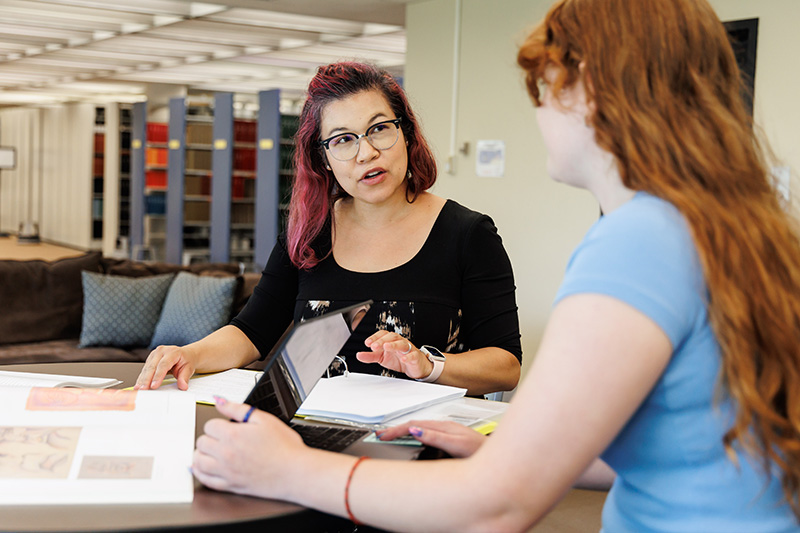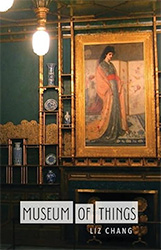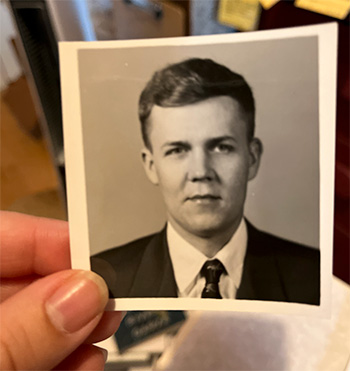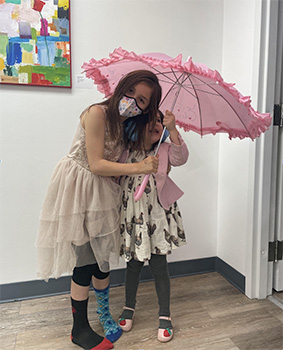
Liz Gray, associate professor of English, working with student Gianna Tully ’24 on her SOAR (Student Opportunities for Academic Research) project during the summer of 2023
With an MFA in poetry and literary translation from Vermont College of Fine Arts, Associate Professor Liz Gray specializes in poetry, flash fiction, literary translation, multicultural and transnational literatures, hybrid identities, and publishing. She advises The Manuscript, Moravian’s literary magazine and co-directs the Moravian Writers’ Conference with Kate Brandes, affiliate faculty member of the Environmental Studies and Sciences Program.
What draws you to poetry, and what about writing poetry do you enjoy? Did this interest grow out of childhood experiences?
When I was in third grade, I was encouraged to select an animal image from a tray my teacher kept in her room and write a haiku about it any time I finished my work early. I’d rush through everything so that I could get access to that tray.
Later, I was encouraged by my parents and teachers to explore writing. I really found poetry in middle school and many years later, in a low-residency program for my MFA (Vermont College of Fine Arts). I often say that writing is the place where I can risk everything with no consequences. If a poem fails, it fails.

If you were to recommend one of your books of poetry, which would it be?
Every writer I know hates to move backwards. I’d recommend my next project if I could! (I’m currently working on two new manuscripts.) If pressed, I’d refer readers to my 2023 book Museum of Things from Finishing Line Press. It’s by far the most personal work I’ve published so far.
In addition to your MFA in poetry you have a BFA from Parsons School of Design; what did you study there, and what was your journey from Parsons to Vermont?
I went to Parsons, after transferring from Rhode Island School of Design, because I wanted to study how people present themselves based on who they believe they are. I found out pretty quickly that studying fashion in NYC is more about launching a successful business than anything else.
I often write about identity in my work, so it’s not as big a leap from fashion to poetry after all.
I did have the good fortune to come across Hettie Jones, one of the rare Beat poets who were women, in one of my few liberal arts classes, and she was the one who said, “You can do this [poetry].”
Define hybrid identities for us and talk about your interest. Does it have anything to do with your pen name, Liz Chang?
Yes, “Liz Chang” is the name I was born with—technically, Elizabeth. It was the name I’d started building in writing circles before I married my husband.

I’ve always felt that I existed at the intersection of my father—who is Chinese but grew up in Hawaii and does not speak Cantonese, his parents’ first language—and my mother, who is, in her words, “a European mix.” She primarily grew up in Florida and California, since her dad was a lead engineer in the early space program, specifically the Mercury and Gemini projects.
I look a lot like my father, but I have very little to hold onto from his heritage; Hawaii became a state during his lifetime, so his parents were very committed to shaping his identity as an American.
That said, I connect to places where multiple influences exist as a legacy. I translate from French, but I’ve dabbled in Catalán (the language of Southern Spain) and Creole (which is primarily spoken in Haiti).
Tell us about flash fiction and can you share an example?
I always tell students that there’s very little difference between prose poetry (as in, poetry that is not lineated) and flash fiction. Even people who have published work in either genre can’t agree on a clear definition. In my mind, it’s usually a short scene driven by poetic language and imagery. As I said before, I’m very interested in exploring intersections of form and identity.
One of the manuscripts I’m working on right now is a series of flash pieces—or prose poems, since two have been published so far in poetry anthologies—about poets who have recently passed. They arrive in an “afterlife,” and generally hate it. I have interwoven lines from some of their works. One of my mentors from VCFA passed in early 2020, and we bonded over our love of aquariums, so I placed him in the Baltimore Aquarium (as a ghost) accompanied by one of the poets he had me read during my time with him. I suppose it’s my homage to some of the voices I’ve loved best.
Are there any specific moments from your experience with students that stand out in your mind as special?
They happen all the time! However, the one that jumps to mind is from my last job at a community college. I taught an introduction to literary analysis class, and one of my students said, “After your class, I will actually read poetry!” My favorite part of being in the classroom is sharing what I love so much with students, so I felt this in my bones.
Share something about yourself that people may not know.
My husband and I met while playing Ultimate Frisbee in a league just outside of Philadelphia. While we were engaged, we played a Game for the Name, and I ended up changing my teaching/legal last name to “Gray” after the team I drafted lost. I’m still bitter about it, but that was the agreement. (The score was close!)
What is your favorite space on campus and why?
Can I say my office? I joke that it’s larger than some New York City apartments that I lived in, and it’s just down the hall from the Writing Center. I often pass students hanging out there, just being themselves or helping others sharpen their writing skills. I’m so inspired by how hard they work to offer parts of themselves, both formally and informally.
What do you like to do with your free time?
I mentioned Ultimate above, but I haven’t played much since early 2020. I spend a lot of time commuting, so I practice yoga most days. I write and read and play with my children (ages 9 and 5). I have a hive of honeybees in my yard that I just got through the winter. Maybe I’ll have spring honey soon.
I can never resist a good ________.
Cheese!
Name someone who inspires you and tell us why?
There are so many women moving into new spaces these days. I just watched Everything, Everywhere, All at Once recently, so the first person who jumps to mind is Michelle Yeoh. She’s had a robust, international career while aging with so much charisma and grace. Yeoh’s character’s life in the film is much more aligned with the immigrant Asian experience—the space both of my paternal great-grandparents inhabited in the early 20th century in Hawaii—but in general, I love media of all kinds that attempts to communicate anything previously hidden.
What is the best advice you have ever received or a quote that stays with you?

Keep writing. Even on the days when I feel positively overwhelmed, I sit down at my weekly designated time and write something. (I don’t write every day, which is advice that never resonated with me. I’m always thinking about approaches to revision, so that kind of brain work happens every day, despite not being able to actually sit down and put new words on the page.) It can be intimidating to stare at the blank page—or, in my case, the blank screen, since I compose primarily on the computer—but every time it gets easier and easier to access the creative side of myself. This does not mean that every poem (or flash fiction piece or creative nonfiction piece or translation) turns out well. There are some that will never be shared with anyone, but the simple act of showing up has become essential for me.
Share something that makes you happy.
I’m responsible for putting my younger daughter to bed most nights. (She’s five.) We read books together before she settles down. She’s also autistic, so she’s memorized large chunks of her favorites. I love reading with her—even if she’s just repeating back the words I’ve spoken every night for weeks before. We pass the reciting aloud back and forth, and I hope that one day she will actually enjoy discovering the words on the page alongside me.